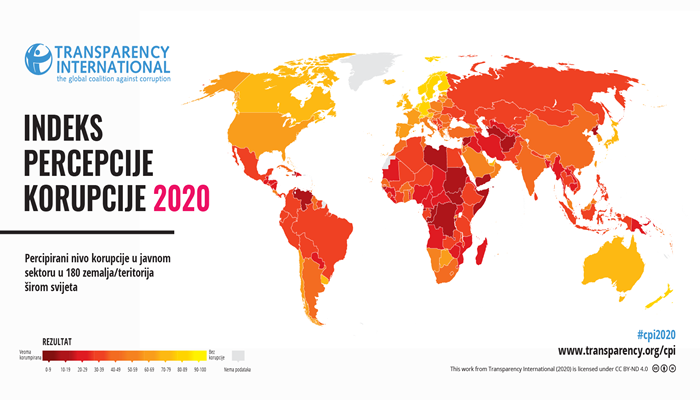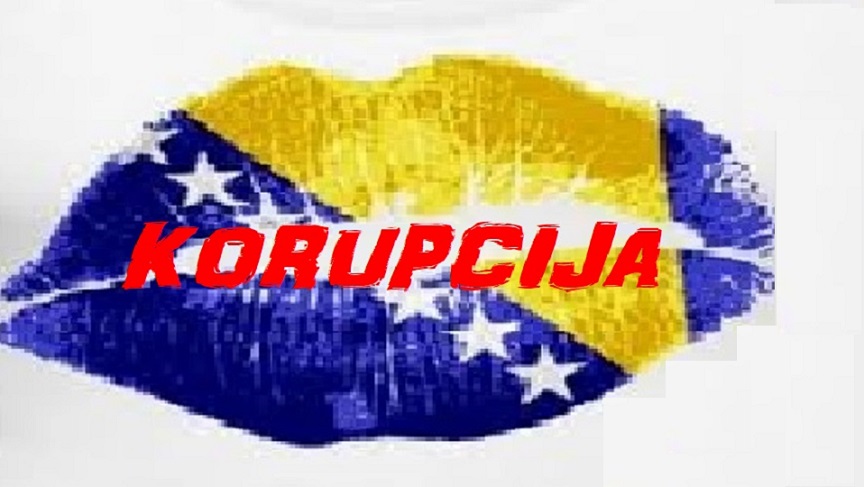Based on the Corruption Perception Index for 2020, BiH is ranked 111 out of 180 countries, with a score of 35 (0-100 scale), which is the worst score since 2012. Once again BiH has been listed as one of the countries which has most regressed in anti-corruption fight.

Sarajevo 28th January 2021 — The Corruption Perception Index (CPI) of Transparency International for 2020, ranks Bosnia and Herzegovina (BiH) among the countries in which corruption is rapidly worsening. The Index indicates that BiH has fallen by 11 places, and ranks it 111 out of 180 countries, with a score of 35 (0-100 scale) which is also the worst score since 2012, when BiH was ranked 72 with a score of 42.
BiH is worst positioned in the Western Balkans region and shares the place with North Macedonia. In the region the best ranked is Slovenia with a score of 60, followed by Croatia 47, Montenegro 45, Serbia 38 and Kosovo 36. Based on the Corruption Perception Index the best ranked countries are Denmark, New Zealand, Finland and other western countries with high level of democracy. Countries affected by war, lack of rule of law and dictatorship are placed at the end of the list, and this year these positions are held by Syria, Somalia and South Sudan.
Contextualizing the findings of the Index, the COVID-19 pandemic undoubtedly marked the past year, but also completely exposed the darkest side of corruption, the price which is unfortunately paid by the citizens themselves. Institutions paralyzed by corruption have made the unscrupulous theft of public funds a priority, although at the expense of ensuring adequate healthcare. The entire period of the pandemic has been marked with non-transparent and unsettled procurement of medical equipment. These, as well as numerous other corruption cases in which criminal trail leads to the very top of the government, and which rocked BiH public, have not been resolved until today which additionally undermined almost invisible credibility of judiciary and public trust. Instead of uncompromising contribution to resolving corruption problem, the judiciary itself has become the most serious problem of BiH society. Politically instrumentalized, without elementary independence and accountability, it requires urgent and in-depth reform based on the conduct of detailed vetting of all judicial office holders, as a first step in the anti-corruption fight.
BiH does not have an adequate policy or strategy for anti-corruption fight, and the legal framework has been waiting for years for a complete and comprehensive reconstruction, which was clearly emphasized by the European Commission as one of 14 priorities for obtaining candidate status. The lack of progress and direct obstruction of improving the legal framework for prevention of conflict of interest, financing of political parties, protection of whistleblowers, and protection of public procurement, only confirms a complete captivity of the state and institutional framework. The level of the state’s captivity raises the issue of legitimacy of the BiH authorities, additionally derogated by systemic frauds and the lack of integrity of the election process. Only during last election campaign, TI BiH recorded more than 2.500 cases of open misuse of public resources during the campaign.
The situation in the Federation of BiH is of particular concern because of the following, the government has not been established although the elections were held two and a half years ago, the Constitutional Court has still been incomplete, there is still no legal framework for protection of whistleblowers, and the Law on Conflict of Interest and the Law on Supression of Corruption and Organized Crime have not been implemented, which together makes the situation in this entity anarchic.
„The country has been going in the wrong direction for a long time, but the COVID-19 pandemic and economic crisis resulting from it, along with the increased deterioration of corruption level, can create highly unstable situation that can put BiH at high risk of complete institutional paralysis“, it was emphasized by Srdjan Blagovcanin, Chairman of the Board of Directors of TI BiH, at the presentation of the Index. „In such context, systematic violation of human rights, existential uncertainty for citizens, as well as life-threatening conditions due to the inadequate reaction of authorities concerning the healthcare of citizens, may lead to the escalation of anger among the citizens“. Undoubtedly, the political parties are the key protagonists of state captivity, under the leadership of absolute leaders who hold the real power, and who have completely taken control over the public sector, using it to gain benefits for themselves, at the expense of public interest.
Direct consequence of a deep-rooted corruption, i.e. intention to stop the disclosure of corruption and to call the responsible to account, represent frequent violation of human rights, as pointed out by the international participants, specifically in the context of restrictions imposed on the freedom of gathering in the Republic of Srpska which has been mentioned in the reports of the European Commission on several occasions. The erosion of democratic standards, suppression of freedom of speech and creation of an atmosphere of intolerance for voices of criticism make a trend that has been constant in BiH for years.
Napomena o autorskim pravima: Dozvoljeno preuzimanje sadržaja isključivo uz navođenje linka prema stranici našeg portala sa koje je sadržaj preuzet. Stavovi izraženi u ovom tekstu autorovi su i ne odražavaju nužno uredničku politiku The Balkantimes Press.
Copyright Notice: It is allowed to download the content only by providing a link to the page of our portal from which the content was downloaded. The views expressed in this text are those of the authors and do not necessarily reflect the editorial policies of The Balkantimes Press.

